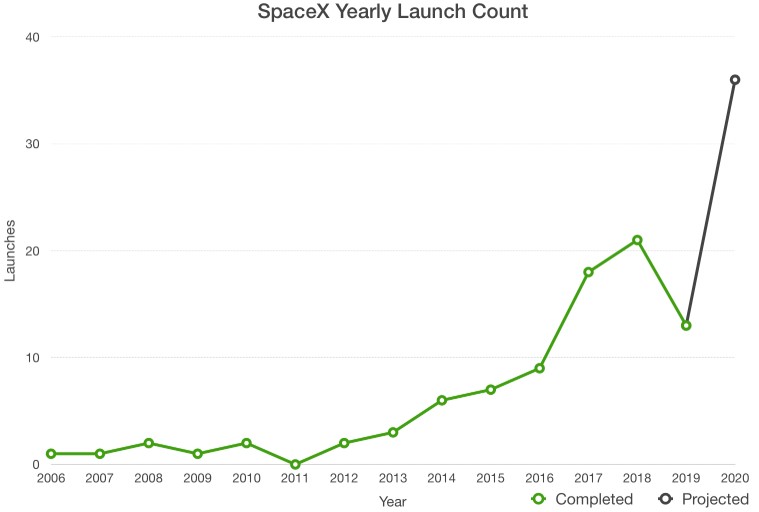Something big is happening in the final frontier. Politicians and investors are looking to space for new opportunities.
President Trump in December signed the $1.4 trillion National Defense Authorization Act. In addition to funding, the legislation creates the Space Force, the first new military service since 1947.
It’s a giant leap for investors.
During the signing ceremony the president called space the world’s new fighting arena. He rationalized that superiority in space is vital to national security. The framing lays the groundwork for a prodigious new wave of investment by the military. It also mobilizes private investors to build sustainable new business models in space.
Famous billionaire investors have seen this coming for a while.
Elon Musk built a SpaceX. The Silicon Valley company, currently valued at $24 billon, has plans to explore and colonize Mars. The company paid the bills in 2019 by launching commercial and military satellites. This year, SpaceX will complete launches about every two weeks as it builds out a constellation of small Starlink communications satellites.
Jeff Bezos, the founder of Amazon.com (AMZN), and Sir Richard Branson, of Virgin Atlantic fame, have invested in rocket businesses, too. In the short term, their bets, Blue Origin and Virgin Galactic Holdings (SPCE), are focused on space tourism. But don’t be fooled by the frivolity. The technology transcends rich people floating 50 miles above the Earth.
Musk, Bezos and Branson understand their relatively small space bets are key to building longer-term competitive advantages in materials science, reusable launch, hypersonic flight and the super secure, extra-terrestrial communication networks needed for the future of big data.
This is one of the key takeaways from a Dec. 19 Morgan Stanley podcast, Why Space Matters More Than Ever.
Analysts note that advances in flight engineering accelerated between the Wright brothers’ first flight at Kitty Hawk in 1903 and the arrival of the Boeing 737 jetliner in 1967. Since then, progress has been more evolution. Current Boeing aircraft, for example, are so similar that 53 years later they still carry the 737 moniker.
What’s coming next, however, will be a revolution.
Space tourism, while it may seem frivolous now, should provide valuable proof-of-concept lessons. It will lead to new investor funding and discussions about future business models. Morgan researchers believe that ultimately these factors could disrupt the $800 billion long haul commercial aircraft sector.
Related post: Profits Heading Our Way Faster Than the Speed of Sound
This may be why HorizonX Ventures, Boeing’s venture capital subsidiary, made a strategic investment in Virgin Galactic in October.
The president’s critics are skeptical about the added value of Space Force. Mark Kelly, a retired astronaut and Senate candidate in Arizona, told Reuters in August that new military service would duplicate work already being done by the Air Force, while creating another level of wasteful bureaucracy at the Department of Defense.
Other parts of the United States military do currently oversee space. The Global Positioning System is operated by the 50th Space Wing, a division of the U.S. Air Force. The unit is responsible for a constellation of 24 GPS satellites maintained from Schriever Air Force Base in Colorado. These satellites provide vital guidance information for both military and civilian uses.
CNN reported in February 2019 that the Chinese and Russian are developing technologies capable of disrupting GPS satellites. During a time of conflict, powerful lasers and kinetic anti-satellite missiles might disrupt, degrade or damage sensors, according to Pentagon analysts.
The value of a separate Space Force is that it raises awareness of space-related issues. It also creates a lucrative new funding ecosystem for aerospace companies. Invariably, disruptive companies like SpaceX, Blue Origin and Virgin Galactic will develop new technologies. Innovative applications will evolve.
Take for example Teledyne Technologies (TDY), which makes electronic instrumentation systems for a variety of end markets. From factory automation to pharmaceutical research, and aerospace to deep water oil and gas exploration, the company’s products help companies manage information more effectively.
Its imaging sensors, cameras and software empower marine, environmental, commercial aircraft, defense and satellite communications systems. In most markets, the company has no competitors because its products are so specialized. This means high margins and lots of earnings visibility.
Sales grew 11.4% in fiscal 2018, to $2.9 billion. Net income surged 47% to $333 million. Through the last 3 quarters, gross profit margins have averaged 39%.
Shares pushed to a record high Friday at $360. The stock now trades at 32x forward earnings, and 4.2x sales. The market capitalization is $13 billion.
Teledyne is positioned perfectly to take advantage of the political and investment changes on the horizon for space. The company makes the value-added information instruments aerospace companies need to collect data.
As new space business models lift off, fortunes at Teledyne are certain to follow. Growth investors should consider buying the stock into any near-term weakness.
Best wishes,
Jon D. Markman





